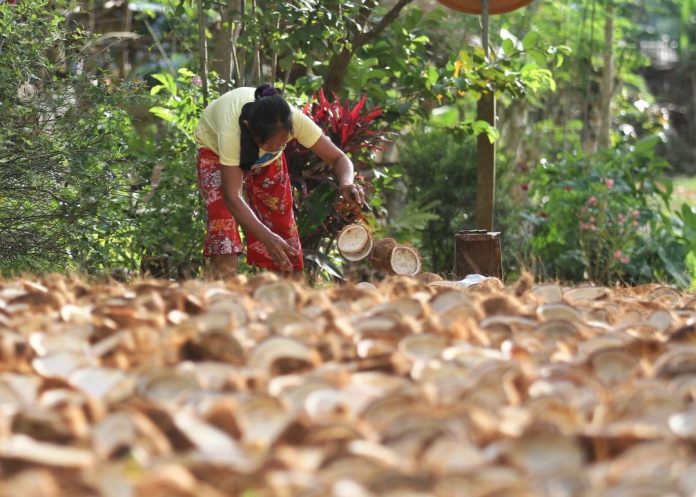
The Philippine Coconut Authority (PCA) assured Tuesday of the continuous expansion and modernization of the country’s coconut industry.
During the Laging Handa public briefing, PCA administrator Roel Rosales said the administration under the agricultural helm of President Ferdinand Marcos Jr. is keen to boost coconut production.
“Gusto po nating mapalawak lalo ang industriya ng niyog sa Pilipinas dahil ito nga ay ating source of income… So tuluy-tuloy po ang pagtatanim natin at in this case, ang tinatanim natin is mas mahuhusay na uri ng pananim – ang tawag po natin dito ay coconut hybrid, ito po ay combination ng good quality ng tall variety at dwarf variety (We want to expand the coconut industry in the Philippines because this is our source of income… So, we are continuously planting at this case and we are planting excellent ones. It’s what we call coconut hybrid or the combination of good quality of tall and dwarf variety),” he said.
Rosales said this is the combination of the “best qualities” of both varieties which help the tree to bear more fruit at an earlier period.
He said the strategy can help meet the country’s need to produce both food and non-food industrial products.
Under the coconut expansion program, the PCA carries comprehensive strategies including hybridization, fertilization intervention for a quick turnaround and intercropping or farm diversification for farmers’ alternative source of income.
“May alternative income ang coconut farmer ‘pag medyo mababa po ang presyo ng copra. Pwede rin po tayong mag-alaga ng hayop, may mga programa din po na nauukol dito (We have an alternative income for coconut farmers if the price of copra drops. We can raise animals under an appropriate program for this),” he added.
The PCA said coconut farmers also benefited under the previous administration’s Coconut Farmers and Industry Development Fund.
This entails a comprehensive program for production, intercropping, training, calamity funding or insurance, marketing assistance and low-interest credit opportunities.
Moreover, Rosales said local farmers are urged to form associations or cooperatives to improve the implementation of PCA’s expansion and modernization programs.
He also bared that another program would be launched for the welfare of coconut farmers.
“Let’s look forward to this – isa pang programa na magtataguyod ng scholarship, college scholarship para sa anak ng ating magniniyog at mga manggagawa (another program that will provide a scholarship or college scholarship for the children of our coconut farmers or workers),” Rosales said.
“The Philippine Coconut Authority is working with 14 other agencies to be able to put all of these services together to benefit our coconut farmers and our farmworkers and for the modernization of the coconut industry,” he said in mixed English and Filipino.
Pest infestation under control
Meanwhile, the PCA assured the coconut farmers and investors that all kinds of pest infestation in the Philippines remain under control.
Rosales said the PCA deployed a team of experts in Anahawan, Southern Leyte to assess the situation and secure intervention following the reported coconut scale insect infestation.
“Under control po ang ating pest infestation all over the country. Sa awa po ng Panginoon ay wala naman pong naging resurgence ng coconut scale insect infestation in the country such that hindi katulad noong dati na malawakan (Our pest infestation all over the country is under control. By God’s mercy, there was no reported resurgence of coconut scale insect infestation, such as the massive ones before),” he said.
Affected farmers were also aided through a cash-for-work program in taking down trees and promised provision of better varieties of coconut to be planted.
To date, 79 provinces in the country grow coconut which help the country secure around USD2 billion worth of coconut production.
About 3 million coconut farmers also rely on the industry, with around 3.6 million hectares of coconut farms. (PNA)






